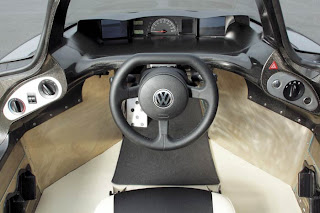 |  |
 |  |
The part that seems too good to be true is the price. I don't know where that came from. I did some google searching and came across a page that casts some skepticism on that low of a price point. Now, that page claims it'll cost more like $26,000. If so, no thanks.. I'd be interested if it were $600 actually.
This is a really neat little car anyways. One website says it's actually two seats, the other one is right behind the front seat... like a jet fighter. The motor is a 299cc single-cylinder diesel engine. I'm not a mechanical person, is single-cylinder even possible? I'm sure it doesn't have the acceleration of a jet fighter :) But with gas prices probably never dropping again, unless we have another deep recession, anything that uses less gas is awesome in my book.
Begin tangent here....
Electric cars are available now, but only really economical if you build one. It's very much like the early days of the Ham Radio pioneers or the computer hobbyists of the 70's. If you want one, it's better and cheaper to build than it is to buy.
Here's a link to a blog of an Aussie ham who has posted about his EV (Electric Vehicle).
According to him, the electric car uses pennies per km of electricity. Their electricity prices cost more there than they do here, that's for sure. I believe they also have a solar panel array set up, although I don't know the capacity, that actually supplies all the energy the car needs.
I'm just going to copy & paste a chart from a .doc file on this page
(The actual .doc file is here)
| Electric Cars are Expensive | You can convert a small car for between $8,000 and $15,000. You can convert a small car and install solar PV panels to charge it for less than the price of a new medium size petrol car! |
| Electric Cars are Slow | Our EV has faster acceleration that it did as a petrol car. It has so much torque it can can pull 5th gear from 0 rpm. |
| They don't have enough range | We drive up to 80km every day. This is perfectly adequate for metro driving. We have a second petrol car for long distance use. But we hardly ever use it and are considering selling it. |
| But we need infrastructure like charging stations | All you need is a power point. There are many more power points that petrol stations already. We have never needed a charging station while driving around Adelaide as our range is fine for a full days driving. |
| The power stations will be overloaded | Power stations are idling at night and could be put to better use. For an average day of 30km driving our EV uses just 5 kWh. We have offset this with a PV solar array that generates 8 kWh/day. So we drive an electric car, pay nothing for fuel, and use less electricity than before! |
| Charging is slow | You don't sit next to the EV waiting for it to charge. We just plug in at night and unplug in the morning. Like a mobile phone. It's easier and takes less time than going to a petrol station. |
Eh, why not include the specifications from the same file.
| Battery pack | 36 Lithium Cells, 3.2V each, better than 10 year life time or 150,000km |
| Operating Voltage | 120V DC |
| Range | 80 to 130 km |
| Top speed | 130 km/hr |
| Conversion Cost | Around $15,000 |
| Economy | 200Wh/km or 4 cents/km. Free “fuel” if you install PV Solar panels at home. |
| Servicing | No servicing is required for Electric Cars. There are no oil changes, radiators, or spark plugs. The only wearing parts are brakes and tyres. |
| Motor | 40kW, 200Nm DC motor. 1,000,000 km life expectancy |
| Seats | 4 Adults |
| Weight | 900kg (40kg above previous weight as an internal combustion car) |
| Driving | Like an automatic. The car is placed in 3rd gear for all forward speeds between 0 and 80 km/hr. No gear changes. |
| Green House Emissions | Zero. The electricity we use in charging is less than the energy our PV solar system makes every day. By recycling an old petrol car we avoided the GHG emissions involved in manufacturing a new car (even a new electric car). |
Mr. Rowe is a pretty good salesman for EVs, I have to say. :)
No comments:
Post a Comment